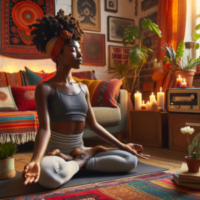
Today is World Mental Health Day and Bariki Body Care wanted to shed some light on the people who are most affected by it and that is the Black Women.
Black women are more likely to care for others more than she cares for herself and less likely to receive proper mental health services, which can lead to higher rates of depression, anxiety and suicide. Mental health issues affect all people, but black women face unique barriers that prevent them from accessing quality care. These include a distrust of the medical establishment due to racial bias in the past; gender discrimination in society at large; and other forms of systemic oppression that make it harder for black women to get help when they need it most.

Black women are less likely to get help for mental health issues.
You may be surprised to learn that black women are less likely to get help for mental health issues. A recent study showed that black women are more likely to be diagnosed with a mental illness and more likely to be hospitalized for one than white women.
The study also found that black women are more likely to be diagnosed with depression than any other group in America, including men. This is especially concerning because people who are depressed are much more likely to commit suicide than those without clinical depression or another type of mood disorder, like bipolar disorder or schizophrenia.

There’s a long history of mistrust in the medical industry among black communities.
There’s a long history of mistrust in the medical industry among black communities. The Tuskegee Syphilis Study, which ran from 1932 to 1972, consisted of 600 African-American men who were told they were being treated for syphilis but were not actually being treated for it. Instead, researchers withheld treatment and watched as the disease progressed in these men, some of whom died from complications like brain damage or heart disease.
But racism within healthcare isn’t limited to just one incident; even today there are still issues with black patients receiving equal treatment as their white counterparts:
- Black patients are less likely than whites to be given pain medication after surgery (even though they experience higher rates of postoperative pain).
- Black children are less likely than white children to receive prescriptions for ADHD medication when diagnosed with attention deficit hyperactivity disorder (ADHD).

When black women seek help, they’re often treated differently than white women.
You’re a black woman. You grew up in the United States and have experienced racism, sexism and other forms of prejudice your entire life.
In your lifetime, you may have been told that it was okay to cry when someone cut you off on the road or if you didn’t get an A+ in school. But when it comes to mental health issues, you might have been taught that showing vulnerability is a sign of weakness — which can make it difficult for black women (and men) to seek help for depression, anxiety disorders or postpartum depression.

More culturally competent care is needed.
The focus on cultural competence is a good thing, but it isn’t enough. Mental health professionals need to be more aware of the unique challenges that black women face, and how those can impact their mental health.
There is an important distinction between cultural competence and racial sensitivity. Both are necessary for effective treatment, but the latter requires more attention than the former because it addresses something much deeper than just being aware of different cultures’ beliefs and practices. It involves awareness of how race affects everyday life—including social structures, institutions, policies and laws.
Being racially sensitive means recognizing that institutional racism exists—for example, in school systems where students are disproportionately disciplined or have higher dropout rates; in housing markets where discriminatory housing policies keep black people from buying homes; or in workplaces where hiring decisions discriminate against qualified black job candidates.
Cultural competency alone won’t cure these problems; they require efforts to dismantle them altogether (or at least make progress toward that goal).

Black women are more likely to die of suicide than any other group of women.
Black women are more likely to die of suicide than any other group of women. And they’re not just more likely to be depressed and anxious; they’re also more likely to experience postpartum depression, which is a major risk factor for suicide. In fact, black women between the ages of 15 and 24 have the highest rate of suicide in that age range.
The trauma experienced by many black Americans has led them to feel helpless in their own lives, which often leads them down a path toward depression and anxiety. In addition, because mental health problems aren’t discussed openly within black communities (and other minority groups), those who are suffering from mental health issues may not feel comfortable reaching out for help when they need it most because there’s no one around them with whom they can share their feelings or concerns about their own health conditions.

The intersection of racism, sexism and multiple other forms of oppression causes mental health issues in black communities.
The intersection of racism, sexism and multiple other forms of oppression causes mental health issues in black communities. Black women are more likely to experience depression and anxiety than any other group. They also have higher rates of self-harm than white women and are twice as likely to commit suicide. One reason for these statistics is that there is an additional layer of stress on black women because they experience both sexism and racism as well; this means that they’re not only dealing with their own internalized feelings of inferiority or self-hatred because they’re a woman, but also because they’re black. This unique way that the experiences of racism, sexism and other forms of oppression intersect creates a unique experience for black women that can lead them to develop mental health problems such as depression or anxiety disorders

There are racial disparities in treatment options available.
Black women are more likely than white women to be diagnosed with depression and bipolar disorder, yet they’re less likely to receive treatment for these conditions. In some instances, black women may not be getting enough help because of their unique circumstances — such as financial and family responsibilities.

Traditional forms of therapy may not be as helpful as other types of counseling.
Traditional forms of therapy may not be as helpful as other types of counseling. Black women, who often don’t trust therapists or psychiatrists because they’re white and male, may prefer to speak to someone who shares their cultural background. In fact, recent research has shown that black women are more likely than white women to seek out a non-white therapist when experiencing mental health issues.
If you see a therapist and aren’t satisfied with the results or if you need help finding one in your area, check out this list of therapists who are specifically trained in working with African Americans and other people of color:

Black women do not receive adequate mental health services
- Black women are less likely to receive mental health services.
- Black women have higher rates of suicide than white women; they are also more likely to be diagnosed with mental illness, but less likely to seek treatment.
Conclusion
The good news is that black women are more likely than other groups of women to seek help. The bad news is that they still face barriers to receiving the care they need. Fortunately, there’s a movement happening right now among mental health professionals and advocates who are working hard to make sure that black women receive better treatment for their mental health issues. We hope this article will help spread awareness about these issues so more people can become involved in fighting them!







